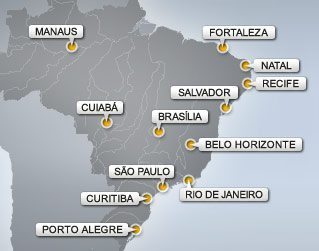December marked a milestone for LTE coverage in Brazil, with carriers hitting the deadline for providing LTE services in both FDD and TDD modes in all 12 cities that will serve as the headquarters for the FIFA World Cup. LTE services have been active since April in all the city headquarters of the Confederations Cup.
All four of the Brazilian telecom operators that acquired LTE licenses — Vivo, Oi, TIM and Claro — reached the goal of covering the 12 cities that will host the World Cup soccer games. As of Dec. 27, Oi still lacked coverage in four cities (Cuiabá, Manaus, Porto Alegre and Natal), according to the consulting firm Teleco. However, on Dec. 30, Oi launched LTE services in 16 more cities, reaching the goal to deploy the network in all World Cup headquarter cities. 
In total, 75 cities in Brazil now have LTE services, covering 31% of Brazil’s population. The latest numbers from telecom regulator Anatel showed that Brazil had not yet reached one million LTE lines as of November when the country counted 270.52 million mobile connections (GSM accounted for 61.33% and W-CDMA, 32.7%). Internet broadband accesses reached 126.6 million in November, of which 3G and LTE represented 104.4 million lines — 89.2 million were cellphone connections and 15.2 million were data terminals.
More news from the Latin American region:
- TIM Brazil announced that it is aiming to enhance sales for small and medium firms in the state of Rio de Janeiro. To reach this goal TIM Brazil said it will expand its commercial partnerships focused on the enterprise market by 60% by July.
- Mexico’s pay-TV market grew 10.3% during the third quarter of 2013.
- Colombia’s telecom regulator CRC reported that consumers will receive compensation for telecommunication service failures.
- Opera Mediaworks plans to expand its operations across the Latin American region during 2014, the company said in a statement. Mahi de Silva, CEO of Opera Mediaworks, noted that the FIFA World Cup and 2016 Olympics Games could boost the company’s performance.

